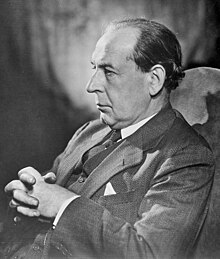Sir John Anderson
|
The Right Honourable The Viscount Waverley GCB OM GCSI GCIE PC PC FRS |
|
|---|---|
 |
|
| Chancellor of the Exchequer | |
|
In office 24 September 1943 – 26 July 1945 |
|
| Prime Minister | Winston Churchill |
| Preceded by | Kingsley Wood |
| Succeeded by | Hugh Dalton |
| Lord President of the Council | |
|
In office 3 October 1940 – 24 September 1943 |
|
| Prime Minister | Winston Churchill |
| Preceded by | Neville Chamberlain |
| Succeeded by | Clement Attlee |
| Home Secretary | |
|
In office 4 September 1939 – 3 October 1940 |
|
| Prime Minister |
Neville Chamberlain Winston Churchill |
| Preceded by | Samuel Hoare |
| Succeeded by | Herbert Morrison |
| Lord Privy Seal | |
|
In office 27 October 1938 – 4 September 1939 |
|
| Prime Minister | Neville Chamberlain |
| Preceded by | Herbrand Sackville |
| Succeeded by | Samuel Hoare |
|
Member of Parliament for Combined Scottish Universities |
|
|
In office 25 February 1938 – 23 February 1950 |
|
| Preceded by | Ramsay MacDonald |
| Succeeded by | Constituency Abolished |
| Personal details | |
| Born |
8 July 1882 Eskbank, Midlothian, Scotland |
| Died | 4 January 1958 (aged 75) Lambeth, London, England |
| Political party | National |
| Alma mater |
University of Edinburgh University of Leipzig |
John Anderson, 1st Viscount Waverley, GCB, OM, GCSI, GCIE, PC, PC, FRS (8 July 1882 – 4 January 1958) was a British civil servant and politician who is best known for his service in the Cabinet during the Second World War, for which he was nicknamed the "Home Front Prime Minister". He served as Home Secretary, Lord President of the Council and Chancellor of the Exchequer. Anderson shelters are named after him.
He was born in Eskbank, part of Dalkeith in Midlothian and studied mathematics and geology at the University of Edinburgh and chemistry at the University of Leipzig where he wrote a thesis on the chemistry of uranium. He was a brilliant student, winning numerous prizes, but at the age of 22 he decided to forsake a career in science and sat for the British civil service examinations, coming first, while also taking a degree in economics. In later life he was elected an honorary Fellow of the Royal Society.
He was appointed to the Colonial Office in 1905.
...
Wikipedia
